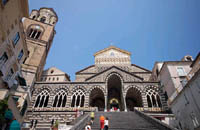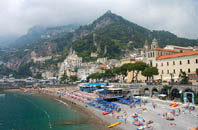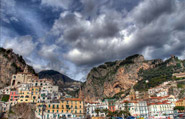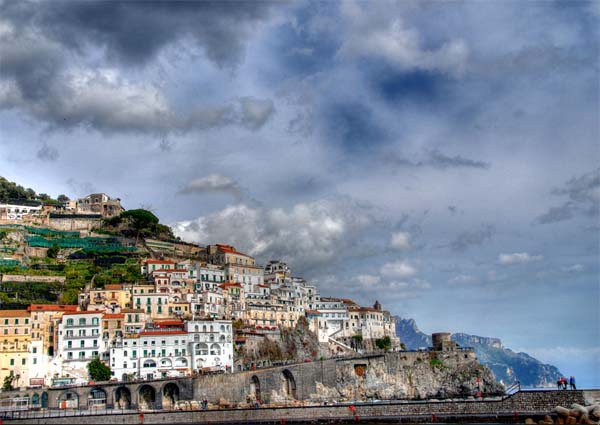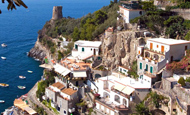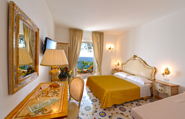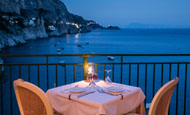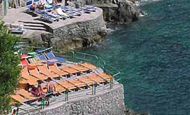AMALFI
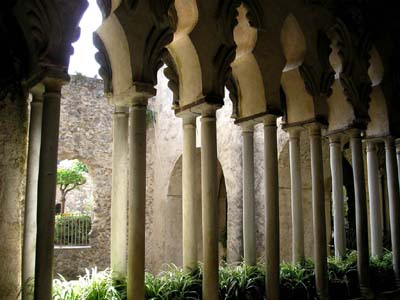
The origin of Amalfi go back to ancient Roman times and even to the Byzantine Empire. Visitors often marvel that a town so small and picturesque was once a “maritime republic”, but geography and the nature of those times help explain Amalfi’s moment of global (or at least Western) prominence. The town declared its independence in A.D. 839, and its perfect strategic location – opening onto a natural harbor at the mouth of a valley rich in water, yet protected by the forbidding Monti Lattari from the incursions of both Turks and Normans – allowed Amalf to develop into Italy’s first maritime republic, before either Pisa or Venice. For 2 centuries, Amalfi was a maritime power to be reckoned with: Its navy kept the Turks at bay, and its maritime code – the Tabula Amalphitana – was recognized as law in the Mediterranean. The small republic was rich and cosmopolitan, and its coins were widely used across the Mediterranean from the Greek empire to Africa to the Longobard territories. Amalfi also dominated the markets in spices, perfumes, silk and valuable carpets.
Amalfi’s toehold among the cliffs eventually became a liability, however; the limited size of its land area and comparable lack of military power obliged Amalfi to accept Norman rule in 1073. Pisa – which had developed into a powerful maritime republic itself in the meantime - then sacked Amalfi in 1135, and in 1143 a terrible seaquake destroyed large parts of the harbour, including the fortifications and the shipyards. The Amalfi of old was completely annihilated 5 years later, when the plague struck in 1348. Afterwards, Amalfi became a pretty fishing village, until it was rediscovered as a tourist destination by 19th century travelers.
Full of mementos of its glorious past and decorated with gardens-olive trees, oranges, and lemons, the groves sloping all the way to the sea-Amalfi is a jewel of a small town. Its central square Piazza Flavio Gioia, commemorates the inventor of the compass (or, at least, the man who perfected it for marine use). Indeed, Amalfi’s mariners were the first in Europe to use the properties of magnetism for navigation, starting back in the 12th century; they provided material for the first nautical charts of the Middle Ages.
Amalfi & the Industry of Papermaking
Amalfi is believed to be the first European location where paper as we know it today was made. The process was discovered and perfected by the Arab, the original name was bambagina referred to the special kind of paper that became known as paper of Amalfi, made from recycled cotton, linen and hemp cloths.The process was then exported to Amalfi through commercial relationship the republic had with the Arab world. The oldest sheets still in existence date from the 13th and 14th
centuries. The bambagina of Amalfi is still highly appreciated by many – for example, the Vatican uses Amalfi paper for its correspondence.
Emeraldo Grotto
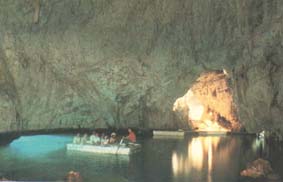 The Emerald Grotto is nearby and is reached by steps or lift and then by rowing through
exceptionally clear water in this marine cave is illuminated indirectly by rays of
sunlight giving it a beautiful emerald colour of extraordinary depth. Reflected in the
water are the marvelous golden coloured stalactites which are suspended from the cave
roof. The road winds on towards a sight that suddenly bursts into view as you emerge from
a tunnel gouged through a cliff. It is unbelievably pretty; tall, white houses, churches
and towers perch atop rocky precipices in the Molini Valley facing a bay of azure blue
with a backdrop of rugged mountains. Three miles of Praiano, the grotto is reached from
the coastal road via a descent by elevator, which sosts 3 Euro, including the boat ride.
Then you board a boat that traverses the eerie world of the groto. The stalagmites are
unique in that someare underwater. You can visit daily 10 am to 4pm. Take the Sita bus in
Praiano going toward Amalfi. The best way to go is by boat from Amalfi or Praiano, leaving
from the docks and costing 6 Euro round trip, plus the 3 Euro entry fee.
The Emerald Grotto is nearby and is reached by steps or lift and then by rowing through
exceptionally clear water in this marine cave is illuminated indirectly by rays of
sunlight giving it a beautiful emerald colour of extraordinary depth. Reflected in the
water are the marvelous golden coloured stalactites which are suspended from the cave
roof. The road winds on towards a sight that suddenly bursts into view as you emerge from
a tunnel gouged through a cliff. It is unbelievably pretty; tall, white houses, churches
and towers perch atop rocky precipices in the Molini Valley facing a bay of azure blue
with a backdrop of rugged mountains. Three miles of Praiano, the grotto is reached from
the coastal road via a descent by elevator, which sosts 3 Euro, including the boat ride.
Then you board a boat that traverses the eerie world of the groto. The stalagmites are
unique in that someare underwater. You can visit daily 10 am to 4pm. Take the Sita bus in
Praiano going toward Amalfi. The best way to go is by boat from Amalfi or Praiano, leaving
from the docks and costing 6 Euro round trip, plus the 3 Euro entry fee.
| Hotels in Amalfi | |
|---|---|
| Hotel Dei Cavalieri Tel. +39 089.831333 Fax. +39 089.831354 |
Hotel La Ninfa Tel. +39 089.831127 Cell. +39. 338.9222258 |
| Hotel L'Antico Convitto Tel. +39 089.871849 Fax. +39 089.94931159 |
Villa Lara Tel. / Fax. +39 089.8736358 |
| Hotel Villa Annalara Tel. / Fax. +39 089.871147 Cell. +39 339.1600277 |
Hotel San Michele Tel. / Fax. +39 089.872237 |
| Hotel Al Pesce d'Oro Tel. +39 089.831231 Fax. +39 089.831684 |
Hotel Il Nido Tel. +39 089.871148 Fax. +39 089.872103 |
| Hotel La Pergola Tel. +39 089.831088 Fax. +39 089.831088 |
Hotel Amalfi Tel. +39 089.872440 Fax. +39 089.872250 |
| Hotel Residence Bellevue Tel. +39 089.831349 Fax. +39 089.831568 |
Hotel Residence Del Duca Tel. +39 089.8736365 |
| Residence Scarpariello Tel. +39 089.872373 Fax. +39 089.872373 |
Hotel Dei Cavalieri Tel. +39 089.831333 Fax. +39 089.831354 |
| Hotel Antica Repubblica Tel. +39 089.8736310 Fax. +39 089871926 |
Hotel Villa Felice Relais Tel. +39 089.831946 Fax. +39 089.832914 |





